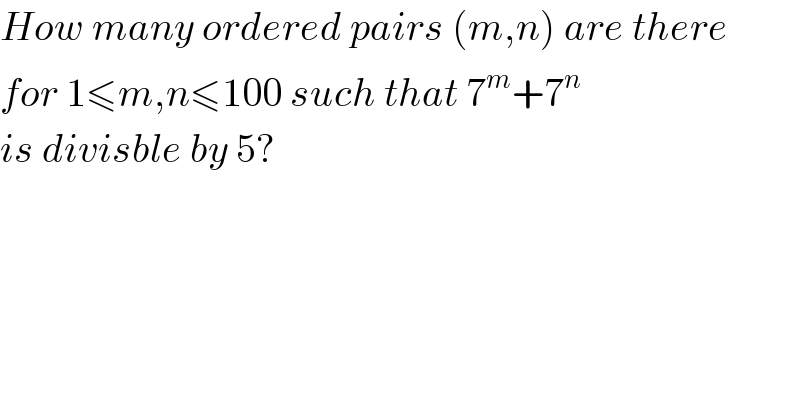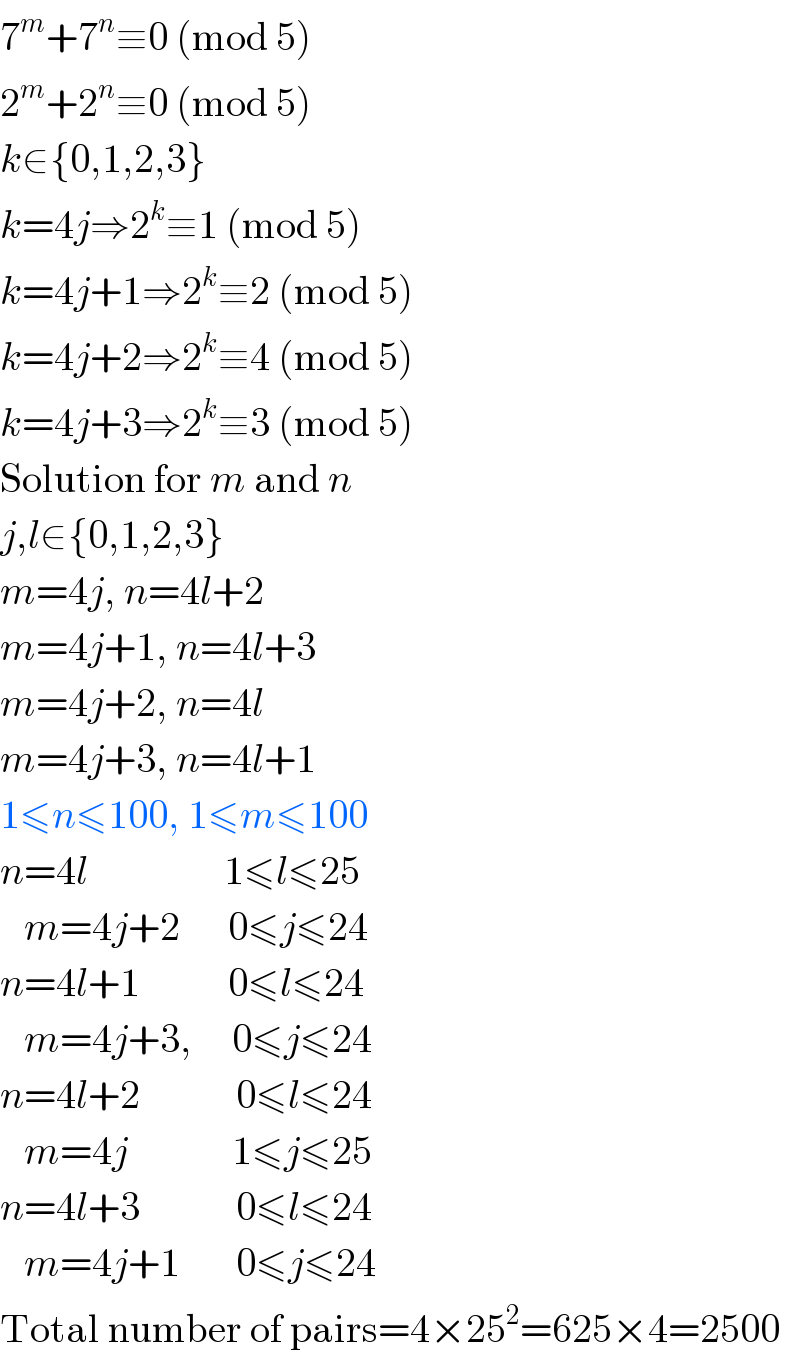
Question Number 2878 by Yozzi last updated on 29/Nov/15

$${How}\:{many}\:{ordered}\:{pairs}\:\left({m},{n}\right)\:{are}\:{there} \\ $$$${for}\:\mathrm{1}\leqslant{m},{n}\leqslant\mathrm{100}\:{such}\:{that}\:\mathrm{7}^{{m}} +\mathrm{7}^{{n}} \\ $$$${is}\:{divisble}\:{by}\:\mathrm{5}? \\ $$
Commented by prakash jain last updated on 29/Nov/15

$$\mathrm{I}\:\mathrm{read}\:\mathrm{the}\:\mathrm{statment}\:\mathrm{1}\leqslant{m},{n}\leqslant\mathrm{100}\:\mathrm{as}\:\mathrm{2}\:\mathrm{separate} \\ $$$$\mathrm{statement}.\:\mathrm{Will}\:\mathrm{update}\:\mathrm{the}\:\mathrm{answer}. \\ $$$$\mathrm{1}\leqslant{m} \\ $$$${n}\leqslant\mathrm{100} \\ $$
Answered by prakash jain last updated on 29/Nov/15

$$\mathrm{7}^{{m}} +\mathrm{7}^{{n}} \equiv\mathrm{0}\:\left(\mathrm{mod}\:\mathrm{5}\right) \\ $$$$\mathrm{2}^{{m}} +\mathrm{2}^{{n}} \equiv\mathrm{0}\:\left(\mathrm{mod}\:\mathrm{5}\right) \\ $$$${k}\in\left\{\mathrm{0},\mathrm{1},\mathrm{2},\mathrm{3}\right\} \\ $$$${k}=\mathrm{4}{j}\Rightarrow\mathrm{2}^{{k}} \equiv\mathrm{1}\:\left(\mathrm{mod}\:\mathrm{5}\right) \\ $$$${k}=\mathrm{4}{j}+\mathrm{1}\Rightarrow\mathrm{2}^{{k}} \equiv\mathrm{2}\:\left(\mathrm{mod}\:\mathrm{5}\right) \\ $$$${k}=\mathrm{4}{j}+\mathrm{2}\Rightarrow\mathrm{2}^{{k}} \equiv\mathrm{4}\:\left(\mathrm{mod}\:\mathrm{5}\right) \\ $$$${k}=\mathrm{4}{j}+\mathrm{3}\Rightarrow\mathrm{2}^{{k}} \equiv\mathrm{3}\:\left(\mathrm{mod}\:\mathrm{5}\right) \\ $$$$\mathrm{Solution}\:\mathrm{for}\:{m}\:\mathrm{and}\:{n} \\ $$$${j},{l}\in\left\{\mathrm{0},\mathrm{1},\mathrm{2},\mathrm{3}\right\} \\ $$$${m}=\mathrm{4}{j},\:{n}=\mathrm{4}{l}+\mathrm{2} \\ $$$${m}=\mathrm{4}{j}+\mathrm{1},\:{n}=\mathrm{4}{l}+\mathrm{3} \\ $$$${m}=\mathrm{4}{j}+\mathrm{2},\:{n}=\mathrm{4}{l} \\ $$$${m}=\mathrm{4}{j}+\mathrm{3},\:{n}=\mathrm{4}{l}+\mathrm{1} \\ $$$$\mathrm{1}\leqslant{n}\leqslant\mathrm{100},\:\mathrm{1}\leqslant{m}\leqslant\mathrm{100} \\ $$$${n}=\mathrm{4}{l}\:\:\:\:\:\:\:\:\:\:\:\:\:\:\:\:\:\mathrm{1}\leqslant{l}\leqslant\mathrm{25}\: \\ $$$$\:\:\:{m}=\mathrm{4}{j}+\mathrm{2}\:\:\:\:\:\:\mathrm{0}\leqslant{j}\leqslant\mathrm{24} \\ $$$${n}=\mathrm{4}{l}+\mathrm{1}\:\:\:\:\:\:\:\:\:\:\:\mathrm{0}\leqslant{l}\leqslant\mathrm{24} \\ $$$$\:\:\:{m}=\mathrm{4}{j}+\mathrm{3},\:\:\:\:\:\mathrm{0}\leqslant{j}\leqslant\mathrm{24} \\ $$$${n}=\mathrm{4}{l}+\mathrm{2}\:\:\:\:\:\:\:\:\:\:\:\:\mathrm{0}\leqslant{l}\leqslant\mathrm{24} \\ $$$$\:\:\:{m}=\mathrm{4}{j}\:\:\:\:\:\:\:\:\:\:\:\:\:\mathrm{1}\leqslant{j}\leqslant\mathrm{25} \\ $$$${n}=\mathrm{4}{l}+\mathrm{3}\:\:\:\:\:\:\:\:\:\:\:\:\mathrm{0}\leqslant{l}\leqslant\mathrm{24} \\ $$$$\:\:\:{m}=\mathrm{4}{j}+\mathrm{1}\:\:\:\:\:\:\:\mathrm{0}\leqslant{j}\leqslant\mathrm{24} \\ $$$$\mathrm{Total}\:\mathrm{number}\:\mathrm{of}\:\mathrm{pairs}=\mathrm{4}×\mathrm{25}^{\mathrm{2}} =\mathrm{625}×\mathrm{4}=\mathrm{2500} \\ $$
Answered by Rasheed Soomro last updated on 30/Nov/15
![Let 7^m ≡r(mod 5) Experimenting and Observing for values of m and r: 7^((0,1,2,3,4,5,6,...)) ≡(1,2,4,3,1,2,4,...) (mod 5) Generalizing: 7^(4k) ≡1(mod 5) ∥ 7^(4h+2) ≡4(mod 5) 7^(4k+1) ≡2(mod 5) ∥ 7^(4h+3) ≡3(mod 5) 7^(4k+2) ≡4(mod 5) ∥ 7^(4h) ≡1(mod 5) 7^(4k+3) ≡3(mod 5) ∥ 7^(4h+1) ≡2(mod 5) Adding corresponding 7^(4k) +7^(4h+2) ≡0(mod 5) 7^(4k+1) +7^(4h+3) ≡0(mod 5) 7^(4k+2) +7^(4h) ≡0(mod 5) 7^(4k+3) +7^(4h+1) ≡0(mod 5) Four types of ordered pairs [(m,n)] satisfying the given statement. 1≤(4k,4h+2)≤100 1≤(4k+1,4h+3)≤100 1≤(4k+2,4h)≤100 1≤(4k+3,4h+1)≤100 Now it′s easy to count Suppose there are x 4k+1 type numbers between 1 and 100 inclusive and y 4h+3 type numbers between 1 and 100 inclusive THEN There are xy ordered pairs of such numbers. A multiplicational table is easy way of recording and counting all required (m,n)′s](Q2893.png)
$$ \\ $$$${Let}\:\mathrm{7}^{{m}} \equiv{r}\left({mod}\:\mathrm{5}\right) \\ $$$$\mathcal{E}{xperimenting}\:{and}\:\mathcal{O}{bserving}\:{for}\:{values}\:{of}\:{m}\:{and}\:{r}: \\ $$$$\:\:\:\:\:\:\mathrm{7}^{\left(\mathrm{0},\mathrm{1},\mathrm{2},\mathrm{3},\mathrm{4},\mathrm{5},\mathrm{6},...\right)} \equiv\left(\mathrm{1},\mathrm{2},\mathrm{4},\mathrm{3},\mathrm{1},\mathrm{2},\mathrm{4},...\right)\:\left({mod}\:\mathrm{5}\right) \\ $$$$\mathcal{G}{eneralizing}: \\ $$$$\mathrm{7}^{\mathrm{4}{k}} \equiv\mathrm{1}\left({mod}\:\mathrm{5}\right)\:\:\:\:\:\:\:\:\:\:\:\:\:\parallel\:\:\:\:\:\:\:\:\mathrm{7}^{\mathrm{4}{h}+\mathrm{2}} \equiv\mathrm{4}\left({mod}\:\mathrm{5}\right) \\ $$$$\mathrm{7}^{\mathrm{4}{k}+\mathrm{1}} \equiv\mathrm{2}\left({mod}\:\mathrm{5}\right)\:\:\:\:\:\:\:\:\parallel\:\:\:\:\:\:\:\:\:\mathrm{7}^{\mathrm{4}{h}+\mathrm{3}} \equiv\mathrm{3}\left({mod}\:\mathrm{5}\right) \\ $$$$\mathrm{7}^{\mathrm{4}{k}+\mathrm{2}} \equiv\mathrm{4}\left({mod}\:\mathrm{5}\right)\:\:\:\:\:\:\:\:\parallel\:\:\:\:\:\:\:\:\:\mathrm{7}^{\mathrm{4}{h}} \equiv\mathrm{1}\left({mod}\:\mathrm{5}\right) \\ $$$$\mathrm{7}^{\mathrm{4}{k}+\mathrm{3}} \equiv\mathrm{3}\left({mod}\:\mathrm{5}\right)\:\:\:\:\:\:\:\:\parallel\:\:\:\:\:\:\:\:\:\:\mathrm{7}^{\mathrm{4}{h}+\mathrm{1}} \equiv\mathrm{2}\left({mod}\:\mathrm{5}\right) \\ $$$$\mathcal{A}{dding}\:{corresponding} \\ $$$$\mathrm{7}^{\mathrm{4}{k}} +\mathrm{7}^{\mathrm{4}{h}+\mathrm{2}} \equiv\mathrm{0}\left({mod}\:\mathrm{5}\right) \\ $$$$\mathrm{7}^{\mathrm{4}{k}+\mathrm{1}} +\mathrm{7}^{\mathrm{4}{h}+\mathrm{3}} \equiv\mathrm{0}\left({mod}\:\mathrm{5}\right) \\ $$$$\mathrm{7}^{\mathrm{4}{k}+\mathrm{2}} +\mathrm{7}^{\mathrm{4}{h}} \equiv\mathrm{0}\left({mod}\:\mathrm{5}\right) \\ $$$$\mathrm{7}^{\mathrm{4}{k}+\mathrm{3}} +\mathrm{7}^{\mathrm{4}{h}+\mathrm{1}} \equiv\mathrm{0}\left({mod}\:\mathrm{5}\right) \\ $$$$\mathcal{F}{our}\:{types}\:\:{of}\:{ordered}\:{pairs}\:\left[\left({m},{n}\right)\right]\:{satisfying}\:{the} \\ $$$${given}\:{statement}. \\ $$$$\mathrm{1}\leqslant\left(\mathrm{4}{k},\mathrm{4}{h}+\mathrm{2}\right)\leqslant\mathrm{100} \\ $$$$\mathrm{1}\leqslant\left(\mathrm{4}{k}+\mathrm{1},\mathrm{4}{h}+\mathrm{3}\right)\leqslant\mathrm{100} \\ $$$$\mathrm{1}\leqslant\left(\mathrm{4}{k}+\mathrm{2},\mathrm{4}{h}\right)\leqslant\mathrm{100} \\ $$$$\mathrm{1}\leqslant\left(\mathrm{4}{k}+\mathrm{3},\mathrm{4}{h}+\mathrm{1}\right)\leqslant\mathrm{100} \\ $$$$\mathcal{N}{ow}\:{it}'{s}\:{easy}\:{to}\:{count} \\ $$$$\mathcal{S}{uppose}\:{there}\:{are}\:{x}\:\mathrm{4}{k}+\mathrm{1}\:{type}\:{numbers}\:{between}\:\mathrm{1}\:{and} \\ $$$$\mathrm{100}\:{inclusive}\:{and}\:\:{y}\:\mathrm{4}{h}+\mathrm{3}\:{type}\:{numbers}\:{between}\:\mathrm{1}\:{and} \\ $$$$\mathrm{100}\:{inclusive}\:\mathcal{THEN}\:\: \\ $$$$\:\:\:\:\:\:\:\:{There}\:{are}\:{xy}\:{ordered}\:{pairs}\:{of}\:{such}\:{numbers}. \\ $$$${A}\:{multiplicational}\:{table}\:\:{is}\:{easy}\:{way}\:{of}\:{recording}\:{and} \\ $$$${counting}\:{all}\:{required}\:\left({m},{n}\right)'{s} \\ $$$$ \\ $$
Commented by prakash jain last updated on 29/Nov/15

$$\mathrm{Thanks}. \\ $$$$\mathrm{I}\:\mathrm{thought} \\ $$$$\mathrm{1}\leqslant{m} \\ $$$${n}\leqslant\mathrm{100} \\ $$
Commented by Rasheed Soomro last updated on 29/Nov/15

$$\mathcal{I}{t}'{s}\:{not}\:{misreading}.{Actually}\:{the}\:{statement}\:{can}\:{also}\:\:{be} \\ $$$${read}\:{in}\:{that}\:{way}. \\ $$
